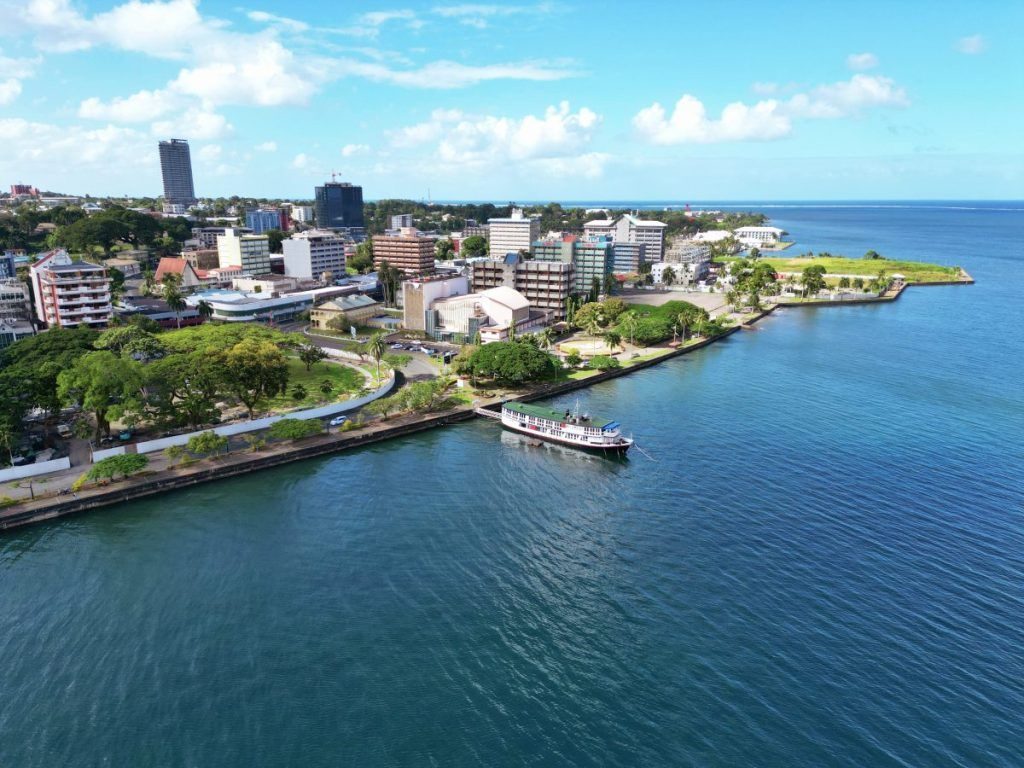While the region prepares itself to advance into an era defined by digital evolution and artificial intelligence (AI), leading expert KV Soon believes that before taking this big dive, Fiji needs to first prioritise foundational digital initiatives, as well as cultivate trust, rather than getting caught up in trying to conform to flashy tech trends.
In an exclusive interview with The Sunday Times, Soon, a seasoned figure in the AI and digital governance space, outlined a roadmap for nations like Fiji navigating this complex terrain.
The first steps
Soon emphasised that the starting point for any government, particularly in developing regions, must be relentless capacity building.
“This technology is not certain yet. Three years from now, the AI we see today may be totally different,” he cautioned.
Governments, he argued, need mechanisms to continuously understand and assess the impact of emerging technologies on their citizens.
“Don’t blindly just take what the world is offering you. But know what you’re doing.”
The cornerstone of this approach, Soon stressed, is trust.
“The whole economy today is going towards what is called digital economy, and in a digital economy, the most important part is trust.”
He compared it with traditional trade, where trust was key in allowing for commerce to flourish between strangers.
Soon explained that this basic concept should be replicated digitally.
“Governments need to look at structures and initiatives to build and enhance that trust.”
Soon highlighted that key to these was the establishment of robust digital identity (ID) systems and data governance frameworks that protect sensitive private data while also allowing for secure transactions to take place.
Strong foundations
Commenting specifically on Fiji’s journey, Soon offered what he labelled as a “biased” but optimistic assessment, acknowledging his involvement in foundational digital initiatives there over the past decade.
He praised Fiji for avoiding a common pitfall, the app frenzy.
“There are some countries just focusing on building apps, building apps, building apps. When you have so many apps, it’s like going into a government office, come out, go into another government office, it’s not consistent.”
Instead, Soon advised that Fiji’s focus needs to be on creating integrated digital ecosystems.
“Fiji must take the trouble to build very foundational initiatives to ensure that the foundations are there. You go into one app, you can do 7 services. You go into another app, you can do 15 services.”
This foundational work, he argued, positions Fiji as an “innovative and very strong nation” in the digital economy within the Pacific, attracting interest from other nations.
“Don’t be carried away by all the fancy stuff that comes out in the front. Build a foundation, build a trust ecosystem and I think Fiji is on the way.”
Google’s presence in Fiji
The announcement of a Google data centre in Fiji was seen by Soon as a positive signal.
“If international organisations want to set up data centres, it means they trust you. They trust you and they trust your infrastructure enough to set up.”
He noted potential benefits, which is set to drive infrastructure improvements (power, water, digital connectivity), knowledge transfer, and potentially spurring more data centre development.
However, Soon urged caution, noting the specifics of the Google project were unclear.
More importantly, he advocated for a regional approach.
“In the Pacific area, we need to have a lot more smaller, capable data centres connected to each other, have a Pacific cloud.”
This interconnected model, he argued, would enhance data security and resilience for smaller island nations, preventing over-reliance on single, potentially external, locations.
“Some countries are so small, 20,000, 15,000 people, what do they need a data centre? They may have micros, but then they can connect. I think a lot of collaboration will be very good.”
Education evolution
When asked for his views about recent calls that were made during the nationwide consultations on the Education Act 1966 from students regarding the integration of AI into the school curriculum, Soon urged for a fundamental rethinking of education as whole and not just a narrow view on technological upgrades.
He argued current schooling is rooted in what he termed as “Industry 1.0” era, designed to feed factory production lines with age-segregated cohorts.
“We are now industry 4.0. But schools worldwide are still very much stuck in this environment.”
Simply replacing blackboards with smartboards or giving students iPads, he contended, is superficial.
“To me it’s just changing clothes. Who benefits? Students? We don’t know. By the end of the day, the people who benefit are those who are selling the pads.”
Soon questioned the rigidity of age-based learning when AI could empower younger children with knowledge previously reserved for older students.
“An AI will make a 6-year-old or a 9-year-old able to know more than a 15-year-old today. Why must he sit in class and start still looking at picture books?”
He challenged educators and policymakers to “rethink schooling from ground up” for the AI era, viewing evolving economies as having a unique opportunity to “jumpstart” this transformation.
While supporting improvements to the current system, he insisted a “new paradigm” is essential.
Essential advice
For Pacific governments embarking on their digital transformation, Soon distilled his advice into a clear mantra, which is to “Build and strengthen foundational initiatives.”
First he urged governments to strengthen their core functions and services first such as prioritising and digitising and perfecting fundamental services like birth registration and company registration.
Build confidence in the digital transformation journey through the implementation of strong data governance and privacy frameworks to create a trusted digital ecosystem.
Only once these foundations are solid should governments focus on developing applications and integrating advanced technologies like AI.
“Think big, start small, run fast,” he said.
“Once you get the foundational correct,” Soon concluded, “you go very fast.”
Collaboration, trust, and building a robust digital bedrock are the key pillars on which Soon is basing his vision for the Pacific region’s digital governance transformation. Technology is not merely a tool but a means to an end.



